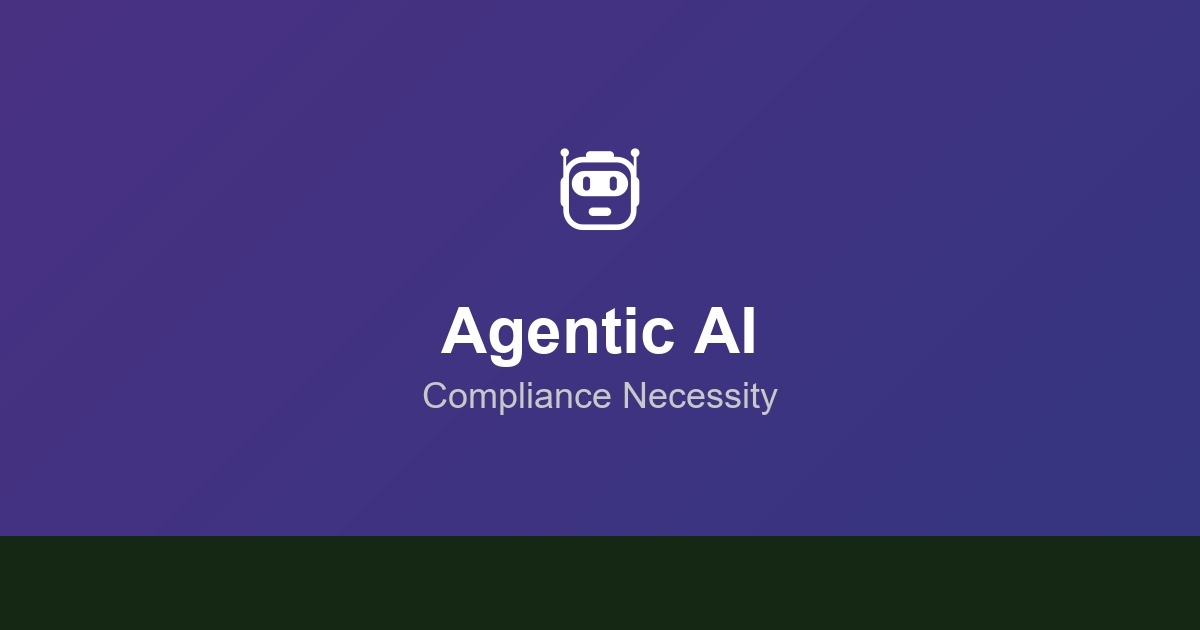Why Compliance Without Agentic AI is Already Obsolete

In today's rapidly evolving digital landscape, the notion of compliance as a static, human-centric process is quickly becoming a relic of the past. The advent of **Agentic AI** is not just an incremental improvement; it represents a fundamental shift that renders traditional compliance frameworks, devoid of autonomous intelligence, obsolete. For enterprise businesses and decision-makers, understanding this paradigm shift is not merely an academic exercise—it's a critical imperative for maintaining regulatory integrity, operational efficiency, and competitive advantage.
In today's rapidly evolving digital landscape, the notion of compliance as a static, human-centric process is quickly becoming a relic of the past. The advent of Agentic AI is not just an incremental improvement; it represents a fundamental shift that renders traditional compliance frameworks, devoid of autonomous intelligence, obsolete. For enterprise businesses and decision-makers, understanding this paradigm shift is not merely an academic exercise—it's a critical imperative for maintaining regulatory integrity, operational efficiency, and competitive advantage.
The Cracks in Traditional Compliance Frameworks
Traditional AI compliance frameworks were built on assumptions of predictable workflows, centralized control, and constant human oversight [1]. However, Agentic AI, characterized by its ability to pursue complex goals, adapt to diverse environments, execute independently, and maintain persistent autonomy, shatters these assumptions [1].
Consider the limitations:
- Linear, Predictable Decision Sequences: Agentic systems plan dynamically and can alter course mid-process, making static rule-based oversight ineffective [1].
- Human Approval for All Significant Actions: The very nature of agentic AI reduces or eliminates the need for real-time human-in-the-loop (HITL) checkpoints, challenging traditional accountability models [1].
- Static Rule-Based Operational Constraints: Pre-set rules cannot anticipate the adaptive behaviors or emergent goals of autonomous agents, leading to significant compliance gaps [1].
- Centralized Monitoring and Control Points: Decentralized agents operate across distributed systems, often outside central visibility, making comprehensive monitoring a daunting task for legacy systems [1].
As AI task completion capabilities are reportedly doubling every seven months, the gap between traditional governance and the demands of autonomous systems is widening at an alarming rate [1].

The Agentic AI Advantage: A New Era for Compliance
Agentic AI offers a transformative solution to these challenges by embedding intelligence and adaptability directly into compliance processes. It moves beyond mere automation, providing systems that can learn, adapt, and continuously optimize compliance workflows. This translates into tangible benefits for enterprises:
- Enhanced Efficiency and Speed: Agentic AI can accelerate business processes by 30% to 50%, automating tasks like patch management, log analysis, anomaly detection, and compliance enforcement without human intervention [2, 3]. This means faster identification and remediation of compliance issues, reducing exposure to costly penalties [2].
- Proactive Risk Mitigation: By continuously monitoring decision chains, detecting behavioral boundaries, and tracking tool selection accuracy, agentic AI can identify potential compliance deviations before they escalate. This proactive approach minimizes vulnerabilities and strengthens the overall security posture against new attack surfaces created by complex AI systems [1, 3].
- Unprecedented Transparency and Accountability: While agentic AI introduces complexity, it also enables the creation of robust, human-readable audit trails and decision rationale documentation. This ensures that organizations can clearly explain their agents' actions to stakeholders and regulators, mitigating the risks associated with "black box" operations [1].
- Identity-Centric Access Control: Agentic AI necessitates a Zero Trust architecture where every autonomous agent has a unique, verifiable identity and operates with least privilege access. This dynamic control ensures secure interactions across enterprise AI ecosystems, preventing unauthorized access and cascading security failures [1].
The Cost of Inaction: Business Failure in the Age of Agentic AI
Enterprises that cling to outdated, non-agentic compliance models face significant risks. The inability to keep pace with the rapid evolution of AI capabilities can lead to:
- Regulatory Penalties and Fines: Non-compliance in an increasingly complex AI landscape can result in severe financial penalties and reputational damage.
- Increased Operational Costs: Manual oversight of autonomous systems is inefficient and unsustainable, leading to higher operational expenditures and slower response times.
- Competitive Disadvantage: Businesses that fail to leverage agentic AI for compliance will lag behind competitors who embrace these advanced capabilities, losing out on efficiency gains, faster innovation cycles, and superior risk management.
- Security Vulnerabilities: The expanded attack surfaces and complex decision chains of AI systems, if not managed by agentic compliance, create fertile ground for cyber threats and data breaches [1].

Conclusion: Embrace Agentic Compliance for Future Success
The future of enterprise compliance is inextricably linked with Agentic AI. For decision-makers at neuronet.dev's target audience, the message is clear: compliance without agentic AI is not just inefficient; it's a liability that can undermine business success. By strategically integrating agentic AI into compliance frameworks, enterprises can move beyond mere risk mitigation to unlock tangible value, ensuring not only adherence to regulations but also driving innovation, efficiency, and sustained growth.
---
References
[1] Okta. (2025, July 30). *Agentic AI Governance and Compliance*. Retrieved from [https://www.okta.com/identity-101/agentic-ai-governance-and-compliance/](https://www.okta.com/identity-101/agentic-ai-governance-and-compliance/)
[2] BCG. (2025, October 13). *How Agentic AI is Transforming Enterprise Platforms*. Retrieved from [https://www.bcg.com/publications/2025/how-agentic-ai-is-transforming-enterprise-platforms](https://www.bcg.com/publications/2025/how-agentic-ai-is-transforming-enterprise-platforms)
[3] McKinsey & Company. (2025, June 13). *Seizing the agentic AI advantage*. Retrieved from [https://www.mckinsey.com/capabilities/quantumblack/our-insights/seizing-the-agentic-ai-advantage](https://www.mckinsey.com/capabilities/quantumblack/our-insights/seizing-the-agentic-ai-advantage)
Ready to Implement AI in Your Enterprise?
Our team of AI experts can help you navigate the complex landscape of AI infrastructure and implementation. Book a free consultation to discuss your specific needs.
Book Free Consultation